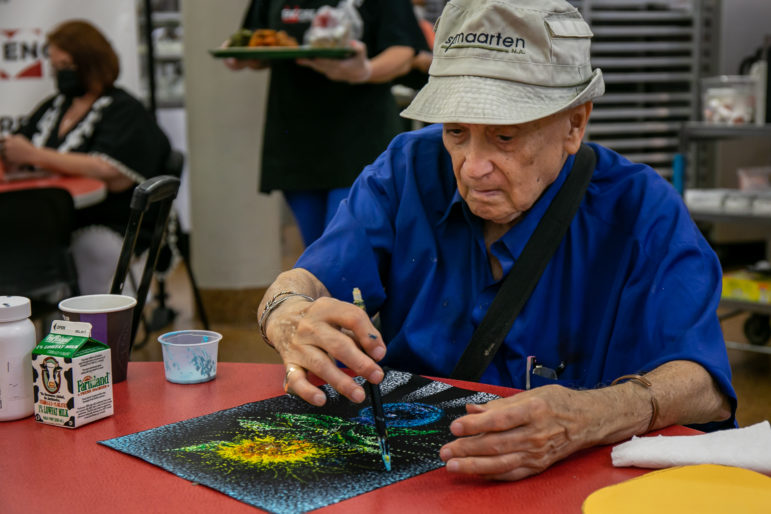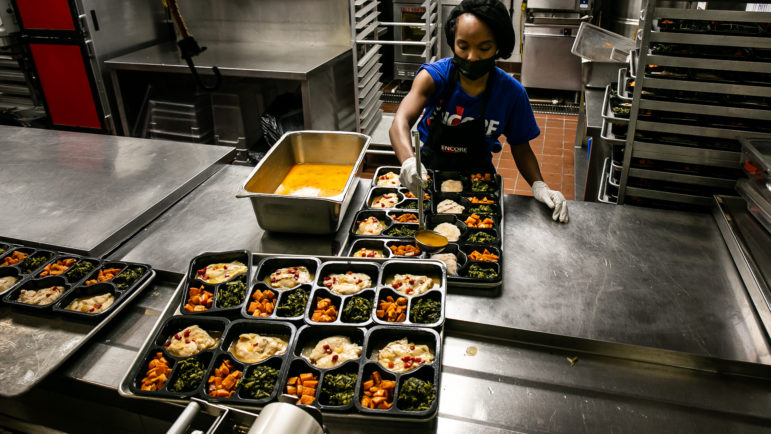By 2040, researchers estimate the number of city residents aged 65 and older will increase by 40 percent. “We should be doubling, tripping, quadrupling on investments for older adult services to meet and match that population increase,” said Councilmember Crystal Hudson, who chairs the Committee on Aging.

Adi Talwar
A member of Encore Community Services’ Senior Center working on an art project in 2022.Lea la versión en español aquí.
New York City’s older adults represent 20 percent of its population. By 2040, researchers estimate the number of city residents aged 65 and older will increase by 40 percent.
But the recently adopted budget of $550 million for NYC Aging—previously known as the Department for the Aging—for fiscal year 2025, which kicked off July 1, represents less than half of 1 percent of the city’s total $112.4 billion budget.
While every dollar counts to meet the growing needs of older New Yorkers—NYC Aging saw its funding increase by more than $28 million, or 5.4 percent, compared to last year’s adopted budget—advocates warn that the city is woefully under-prepared to support the aging boom. They’d pushed for an even bigger boost for the agency, a budget increase of $82 million from last year’s allocation.
“We should be doubling, tripping, quadrupling on investments for older adult services to meet and match that population increase. A trend for this budget was that the Council fought really hard to restore a lot of the cuts that the mayor had made. But we need to go beyond just restoring those cuts, we need to now actually invest deeply in these programs and services for New Yorkers,” said Councilmember and Chair of Committee on Aging Crystal Hudson.
But there were key wins in the adopted budget, advocates say. They include $4.75 million in new funding for home delivered meals that are provided to older adults who are homebound and unable to prepare food on their own, representing an extra $1 per meal. That helps cover the costs of groceries, preparation of the food, and deliveries.
“We did a survey earlier this year that showed that for every meal served, providers on average faced a $2.53 deficit, meaning they are supplementing the city program with funding that they’ve privately raised or funding from where they have surpluses,” said Kevin Kiprovski, director of public policy at LiveOn NY, an advocacy organization that works to improve conditions of older New Yorkers and represents some 120 organizations working with seniors.
“So this [$1 increment] gets meal providers closer to the actual cost incurred for meals,” Kiprovski said.
But the demand still far outweighs the resources available, providers say. Citymeals on Wheels, which provides meals and companionship for New York City’s older adults, recently partnered with CUNY Urban Food Policy Institute to survey 500 older New Yorkers receiving meals at home and at the city’s older adult centers.
“The results are disturbing. Over 50 percent of them said they experienced food insecurity in a given month,” said Beth Shapiro, chief executive officer of Citymeals on Wheels. Another organization that offers meals and other care to older New Yorkers, Encore Community Services, echoed this.
“One meal a day, five days a week, is not providing people with the nutrition that they need. Don’t get me wrong, that one meal is a fully nourishing meal, but it’s one-third of your daily caloric needs. It’s just not enough,” said Jeremy Kaplan, executive director at Encore Community Services.
“When I go to deliver meals, it’s not uncommon for another older adult neighbor to pop their head out and say, ‘Where’s my meal?’ I know there is a profound need for service among New Yorkers that we haven’t even assessed,” he added.

Adi Talwar
Home delivery and grab-and-go meals being served and packed at Encore Community Services’ Senior Center in 2022.The adopted budget also reverses planned cuts to NYC Aging’s budget, restoring $1.1 million for older adult centers and $11.1 million for maintaining other senior supports, according to Tara Klein, deputy director of policy and advocacy at United Neighborhood Houses, a policy and social services organization.
Those reversals enable organizations that contract with the city to continue programs that advocates describe as “a lifeline” for older adults.
This includes the South Asian Council for Support Services (SACSS) in Flushing, where programs range from educating seniors on how to access city and medical benefits in the language of their choice, to organizing wellness workshops and day trips.
“Some of them have lived and worked their entire life in Queens but have never been to Times Square or Brooklyn Botanic Garden. They tell us how relaxing it was,” said Mary Archana Fernandez, director of family support services at SACSS.
Fernandez said they still need additional funding to better serve older immigrants who did cash jobs all their life and now get just $400 per month in social security to survive on. There are also a vast number of older immigrants, she added, who fear using the organization’s services, mistakenly worried that it may affect the benefits their children are getting in the U.S.
The new budget also offers some respite for case workers who support older adults. The human service workers in the aging sector are set to receive a 3 percent pay increase, known as a cost-of-living adjustment (COLA).
“Thanks to the mayor, for the first time we were able to see a COLA and salary increases for people who work tirelessly every day, on behalf of older adults. They need the incentive to keep doing this fabulous work that they do every day,” Commissioner Lorraine Cortés-Vázquez of NYC Aging said in an interview with City Limits.
But advocates critiqued the salary increment as barely scratching the surface, saying these workers have been chronically underfunded.
“Caseloads have astronomically gone up over the years. Many older adult clients are presenting with higher rates of undiagnosed mental health issues. The work case managers have to do is more intensive,” said Klein.
Because of low wages, organizations serving older adults said they face challenges retaining trained staff, leading to an increase in the workload of case managers, according to a survey conducted by LiveOn NY in February. Some case managers reported being in charge of up to 115 clients at a given time, and clients waiting up to three months to speak to a case manager.
And While NYC Aging does not have a standalone capital budget, advocates say older adult centers have not seen comprehensive infrastructure investments for decades. Some centers have broken floors, HVAC systems, and elevators that urgently need repairs.
Additionally, NYC Aging is facing a large fiscal cliff in fiscal year 2026, with an $80 million cut as federal stimulus money expires, which advocates say could potentially close up to 60 older adult centers unless replacement funding is secured.
But Commissioner Cortés-Vázquez is optimistic, saying the city has invested significantly more resources into services for older adults in recent years.
“The budget has increased tremendously in the last five years. When I first got in, the budget was under $350 million and now it’s $550 million,” she said. “Like all budget processes, it’s on the books, and it’ll be a negotiated process. I have a lot of confidence in this administration and its commitment to older adults.”
Organizations working for older adults recognize that NYC Aging has inherited decades of underfunding, but are concerned the investments are not happening fast enough and urge Mayor Eric Admas to take aging seriously.
“Everyone talks about the budget being a moral document, but if the budget doesn’t invest in our city as an aging city, it’s also an ageist document,” said Kiprovski.
“It’s very clear where the money is going and where it’s not, it’s not going towards ensuring that our city remains accessible, ensuring our city remains a place where people can age with both dignity and with participation in their community, and where their value is recognized.”
To reach the reporter behind this story, contact Subeksha@citylimits.org. To reach the editor, contact Jeanmarie@citylimits.org
Want to republish this story? Find City Limits’ reprint policy here.








